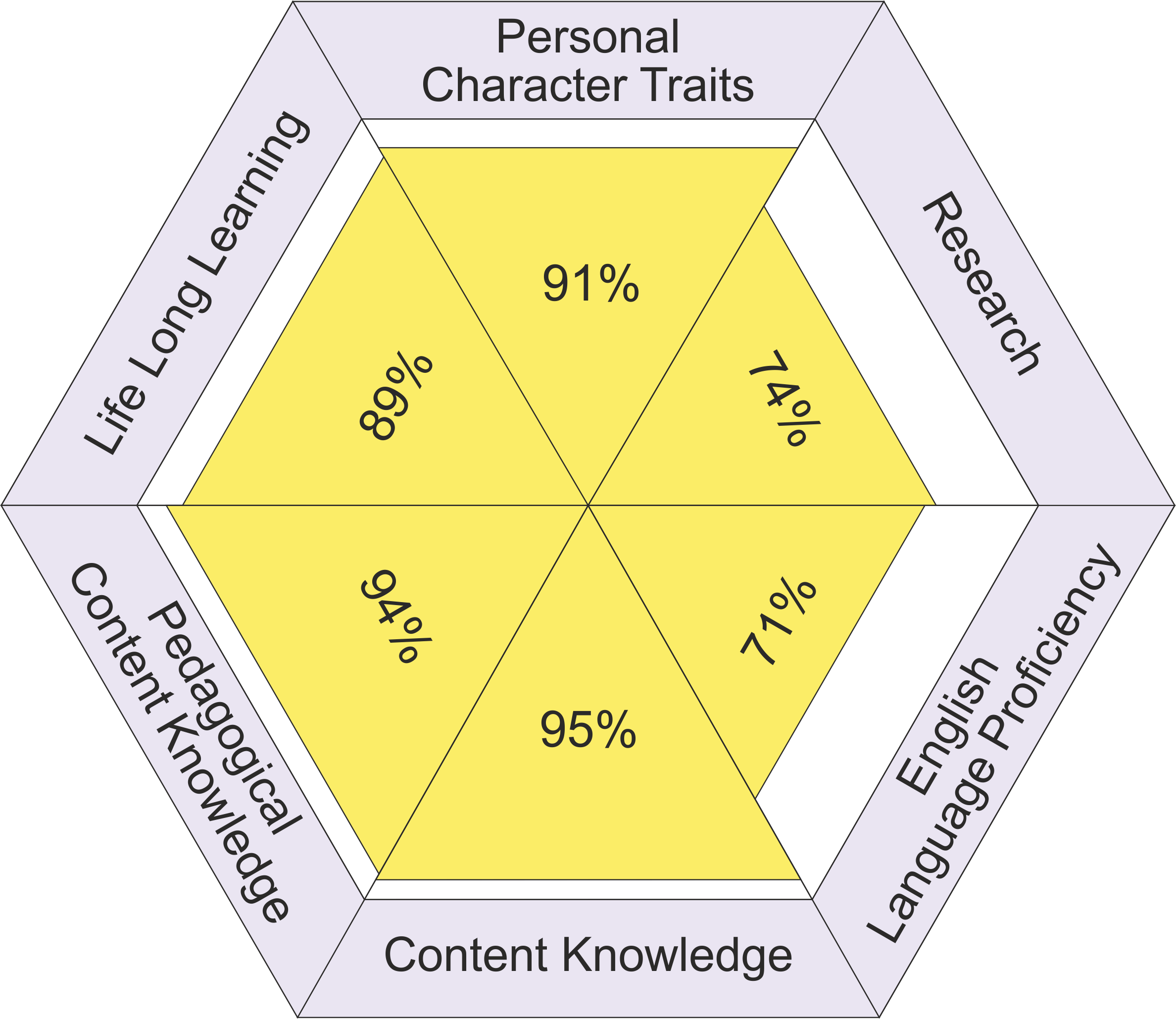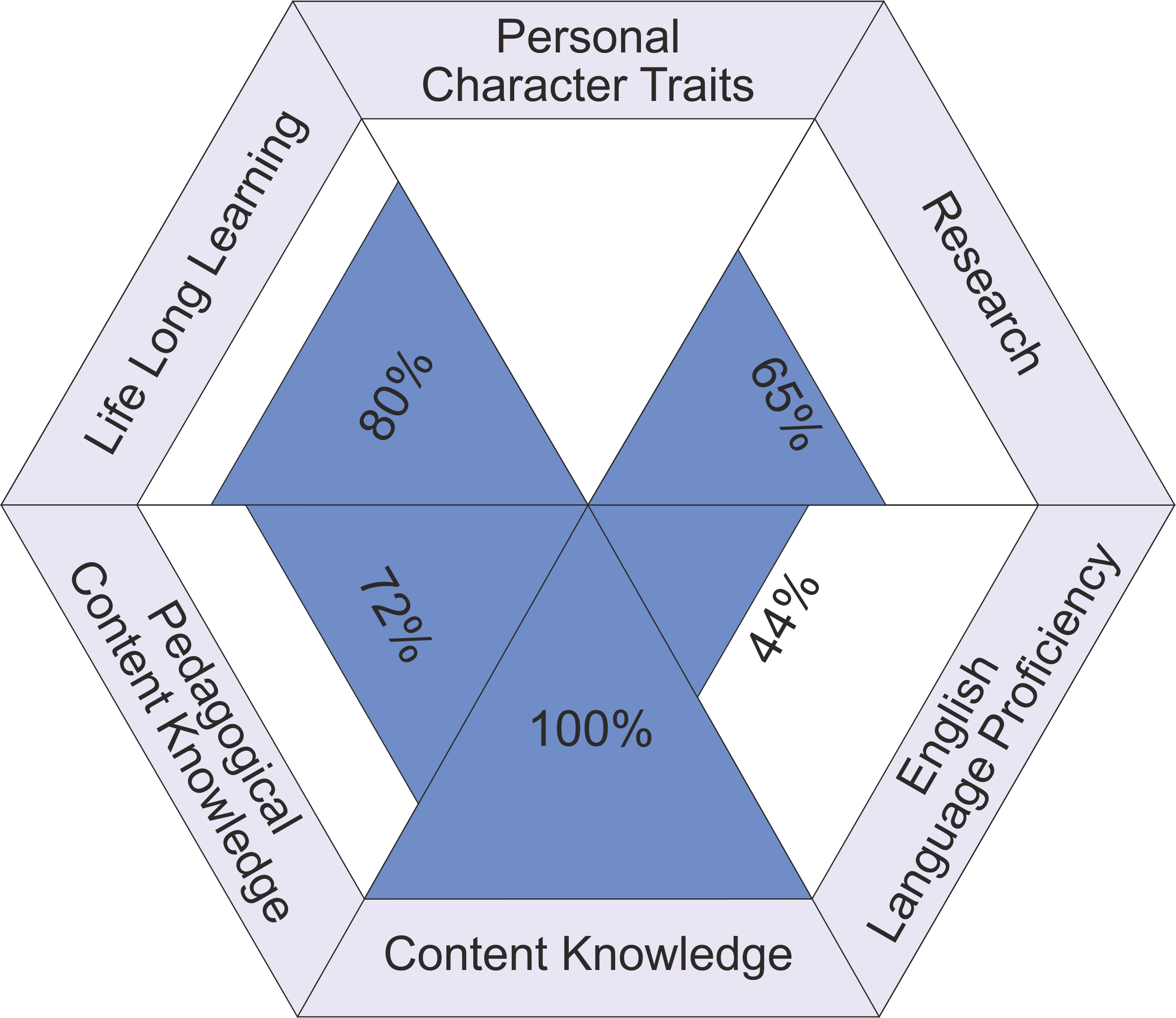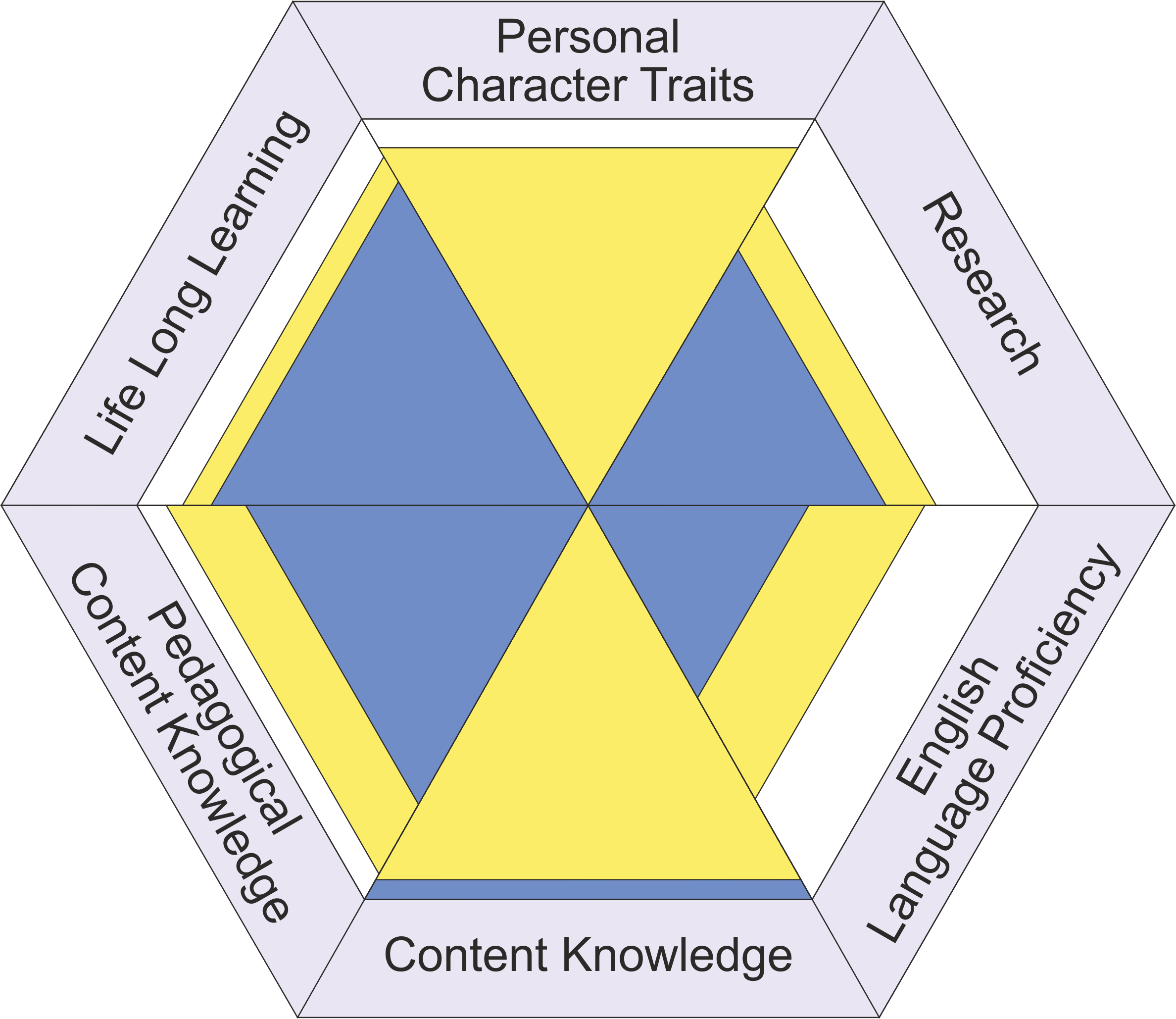Abstract
Tertiary education worldwide has undergone profound changes recently stemming from internationalization, significant academic migration and transformed students community. Transforming environment sets new requirements not only for the curriculum, but for the people, delivering the contents of academic disciplines. The idea of the research, conducted among teachers and students of the Institute of Management, Economics and Finance (IMEF), Kazan Federal University (KFU), is to explore the teacher's perception of their classroom performance as well as the students' attitude to teachers with the view to develop the pillars for a competent tertiary teacher’s brand. The results of the undertaken research prove that the corner stone of the problem is the teaching competences of the academics or pillars as we describe them. The challenge here is that most of the tertiary teachers who work in Russian higher educational institutions (HEIs) lack a degree in education, which predetermines pedagogic content knowledge along with subject matter knowledge. However, most of respondents participating in the survey highlight the importance of the former for a successful teaching career. Therefore, the students of the IMEF as well as the teachers feel the necessity to transform the teaching process at the university and to define the pillars of teacher's brand that would contribute to the global recognition of the whole university.
Keywords: Higher educationtertiary-level teachersacademic staffuniversity lecturer
Introduction
The system of higher education in Russia has been witnessing profound changes for the last 15 years. The Bologna process was a starting point, which eventually transformed the face of higher education, adjusting it to the European education standards. Universities’ consolidation program was the next benchmark of the governmental reform in higher education subsequently leading to the merger of existing universities into large, multi-profile institutions (Latypova et al., 2016).
During this time there have been significant changes in the teaching environment in universities. Educational migration has become an indispensable constituent of university education, providing additional opportunities for children from different social groups to get an access to a better education. Thus, the students’ audience is more diverse as well as their needs and expectations, which may vary in accordance with cultural and educational background, language knowledge and attitude towards education on the whole (Grigorieva et al., 2015). Under these circumstances there is a growing necessity for academic teachers to revise their teaching practices to provide high quality tertiary education and engage students into the learning process. Moreover, ongoing technological progress poses additional challenges to the academic staff inducing them to integrate new technologies into their classrooms and teaching methods.
Thus, Kazan Federal University (KFU), being one of the leading universities in Russia, needs to establish a strong brand and enhance its academic reputation around the world. The academic staff is one of the driving forces capable of implementing the university strategy through the discipline knowledge, inspiring teaching methods and scientific collaboration (Zalyaeva et al., 2014). Hence, an academic teacher can improve the university’s visibility by building up his/her personal brand to become a prominent figure in the academic community and to be considered as a gifted and talented teacher among the students. The times of scholastic approach to education became a thing of the past. The students we work with these days are critical thinkers, eager for knowledge and mature enough to assess you as a teacher and content provider. England, Wales and Northern Ireland have already launched the National Student Survey, aimed at assessing undergraduate students' attitude towards the university they studied at. As a result, universities had to take students’ feedback more seriously, otherwise, their reputation could get tarnished (Unistats, n.d.). Thus, higher educational institutions need to consider students’ demands and make a revision of existing standards towards the academics’ employment and their movement in the career ladder.
Problem Statement
Professional standards for an academic teacher at a tertiary level in Russia
Stable improvement of regulations related to the employment and performance assessment of the academic staff serves as a crucial element of the governmental reform in higher education. At the plenary session of the X Congress of Russian Rectors Union in 2014, V. Putin admitted that the development of the national higher education system incorporates improvement in the content of educational programs and in the quality of teaching as well (Congress of Russian Rectors Union, (2014)). The President underlined the urgency for a university graduate to have solid subject knowledge and the ability to transfer this knowledge into the real life. The usage of effective employment contract and performance appraisal is the possible solution to the academic staff efficiency assessment issues. Performance appraisal is therefore an assessment of an academic teacher performance in relation to the objectives, activities and strategy of the university s/he works for. It encourages the academic staff to increase their productivity and job effectiveness.
Kazan Federal University as a recruiter determines its own components of an effective employment contract critical for its strategic development plan. As stated in the document “Qualification requirements for the candidates to be employed at KFU” confirmed by the Academic Council of KFU, the job-seekers will predominantly need the academic degree, not less than one year of work experience in the sphere of education, scientific research and publications (Kvalifikacionnye Trebovaniya, (n.d.)). Obviously, scientific research lies at the basis of an academic teacher Key Performance Indicator (KPI): publications in Web of Science or Scopus databases, impressive h-index, participation at international conferences, scientific collaboration, involvement into international projects (e.g. Erasmus+, Russian Foundation for Humanities, etc.).
Notwithstanding an inconsiderable emphasis, which the document lays upon the teaching, including MOOC development and textbook publishing, it however fails to regulate the effectiveness of teaching methods, tools and techniques deployed by the academic teacher at a tertiary level. Moreover, the document itself doesn’t oblige the candidates to have an academic degree in education. In fact, in accordance with the Order of the Ministry of Labour and Social Protection of the Russian Federation from September, 8th, 2015 “On approval of the professional standard for a “Teacher of professional training, tertiary education and supplementary vocational education” an academic teacher should have an academic degree in the professional field of the educational program s/he works and specializes in. This signifies the fact that the academic degree in education for a tertiary-level teacher is not compulsory at the federal level as well. The Order only specifies further training once in three years, but that doesn’t imply that the training will be in the field of education, namely in the field of teaching methods and techniques. Subsequently this can gravely affect the quality of lecture and seminar delivery and, as a consequence, the student’s attitude and satisfaction about the course.
Requirements for the academic staff worldwide
Unlike Russian higher educational landscape, where having a teaching qualification doesn’t strongly affect your career prospects, European and American educational policy makers have a contrasting approach towards the relevance of pedagogical background. Specifically, they developed tutorial options which are compulsory for those obtaining their Diploma in higher education, striving for being engaged in academic environment. For instance, in the USA teachers have an opportunity of being employed at a tertiary level without a teaching qualification. However, it is the absence of an appropriate qualification in teaching which can restrict the prospects of getting a promotion at a higher education institution (HEI).
Basically academic teachers may take qualifications at various levels: Level 3 Award in Education and Training (a short introductory course including peer-to-peer teaching practice), Level 4 Certificate in Education and Training (provides practical teaching skills and a minimum of 30 hours of teaching practice), Level 5 Diploma in Education and Training (training for a full teaching role, including educational theory and a minimum of 100 hours of teaching practice). These qualifications may be undertaken in Further Education (FE) colleges, often on a part-time basis. For Levels 4 and 5 qualifications you'll usually need to be employed in a teaching role or be able to organize your own placement for teaching practice (Training to teach in further and higher education (n.d.)).
Tertiary level teacher’s (TLT) model overview
Along with subject matter knowledge and pedagogical content knowledge other constituent elements of tertiary teacher professionalism are pivotal to consider. I. Mentor identifies the following stages of a teacher development: effectiveness – reflection – enquiry – transformation (Mentor et all, 2010). While the first stage incorporates subject and teaching methods knowledge (Mahony and Hextall, 2000), the second one emphasizes the need for continuing and collaborative professional learning. Enquiry presupposes a growing desire of a teacher to get involved into research, often associated with university staff working in partnership with teachers and lecturers in schools and colleges investigation (Baumfield et al., 2013; Efron and Ravid, 2013). The last stage involves the elements of the previous ones, however, its key defining feature is the ‘activist’ dimension in the approach to teaching: a teacher should be contributing to social change and be preparing students to contribute to a social change (Mentor et al, 2010). Taking into consideration I. Mentor’s models of a teacher we outline the following additional pillars constituting the tertiary teacher’s brand: desire for a continuous or life-long learning (LLL) and engagement into scientific research. Moreover, the framework of IMEF integrating academic mobility programs implies English language proficiency and certain personality traits such as high intelligence, the sense of humor, respect, communicative skills, objectiveness in assessment to be capable of collaborating with the international audience (Galishnikova, 2014).
Research Questions
To attain the goal of the current study we identified the key questions:
1.What is the general students’ perception of academic staff teaching in IMEF?
2. What is the IMEF academics' perception of a tertiary-level teacher’s constituent features?
3.What are the pillars for a competent tertiary-level teacher’s brand?
Purpose of the Study
The purpose of our study is to identify the pillars constituting a tertiary-level teacher’s brand. To do this we need to investigate students’ perception of academics with its further comparison and contrast with teachers’ own evaluation of their role in academic environment. The discrepancies and common areas found are going to contribute to the pillars development building the brand of an academic teacher at a tertiary level. This model will eventually be applicable in the academic teachers’ KPI development as well as in their profile upgrade. As a consequence, this strategy may induce the academics to be in high demand among the students, which in turn might boost the university’s position in the world ranking as well.
Research Methods
The findings reported in this paper are based on the analysis of quantitative data generated from two separate research projects in IMEF. The first project involved 83 representatives from the teaching staff, 10 male and 73 female, with various teaching experience. The main objective of the first study was to identify academics' attitude towards the necessity of getting additional training in the field of education and common challenges that they are facing in teaching, their involvement into the scientific research and eagerness to be enrolled into the program of continuous education.
The other one comprised 152 undergraduate students (namely 36 – 1st year, 59 – 2nd year, 35 – 3rd year, 22 – 4th year students majoring in economics, management, municipal services, tourism and hotel management) and 37 graduate students mastering in Association of Chartered Certified Accountants (ACCA) program. The questionnaire incorporated 14 items, which were further categorized into six dimensions: (1) personality, (2) subject matter knowledge, (3) pedagogical content knowledge, (4) engagement into research, (5) life-long learning, (6) English language proficiency. The questions were calculated with Likert’s offering five choice scale where 1 – strongly disagree, 2 – disagree, 3 – neutral, 4 –agree, 5 – strongly agree. Further, the influence of these six dimensions on students’ satisfaction with the quality of academic studies at the University was measured.
The next step of our research was devoted to the development of a tertiary teacher’s brand model extrapolated from the students’ and academics’ perception along with KFU management requirements. The obtained results in six dimensions presented above were overlapped leading us to the unique model of a tertiary teacher’s brand, favourable for three parties, namely the student, the teacher, the university.
Findings
According to the data provided in Figure

As predicted, there is a considerable correlation between the teacher’s pedagogical content knowledge (
The data obtained by means of the questionnaire among the IMEF KFU faculty demonstrates that most of the surveyed teachers give absolute priority to content knowledge (100%), followed by a necessity for a LLL (80%) and pedagogical content knowledge (72%), supporting the idea of getting additional qualification in education. It is surprising that only 65% of IMEF teachers consider research activities as an integral component of their job. The possible reason may include an inadequate workload sharing between teaching and research activities. The least significant issue according to the respondents is their English language proficiency which could be due to the surveyed teachers age discrepancy and insufficient language learning experience. Teachers’ personal character traits are the limitations of our study due to the fact that they bear subjective character and cannot be measured adequately, therefore this part of a diagram is left unfilled (Figure

The information gained provides a valuable basis for comparison of students’ perception of a successful and competent teacher with the perception of academic staff themselves (see Figure

Therefore, we may conclude that these six dimensions constitute the pillars of a competent tertiary teacher's brand. A tertiary teacher capable of raising the University profile in the World ratings is an expert in his/her professional field constantly involved in the research activities and grasping any opportunity to widen his/her skills and competencies with the priority given to additional training in teaching methodology. Even though the teachers underestimate the English language proficiency in their responses, its importance is supported with the Academic mobility indicators and education internationalization on the whole. Moreover, a teacher of a new format is an intelligent person capable of communicating with students respecting their personal attitudes; punctual, responsible, reliable and possessing a sense of humour.
Conclusion
Thus, in the course of our research we have identified six dimensions or pillars that constitute the competent teacher's brand. These are subject matter (or content) knowledge, pedagogical content knowledge, personal character traits, life long learning and research involvement. These pillars evidenced from students' and teachers' perception could serve as a guidelines for the University management in developing the teachers' performance assessment system as the tertiary teacher capable of engaging the students in the subject matter and provoking his/her interest in the discipline is a valuable intangible asset for the University which is striving to achieve the top of the ratings. Moreover, the results of the research highlight the idea that professional degree of a tertiary teacher is an obligatory but not the only pillar of a successful educational process in the HEI since the teaching qualification dimension which is currently ignored by the Russian higher education system greatly contributes to the academic progress in the University.
Acknowledgments
The work is performed according to the Russian Government Program of Competitive Growth of Kazan Federal University.
References
- Baumfield, V., Hall, E. and Walk, K. (2013) Action Research in Education (2nd edition). London: Sage.
- Cochran-Smith, M., Lytle L., Susan (2015). Inquiry as Stance: Practitioner Research for the Next Generation.
- Congress of Russian Rectors Union. (2014). Retrieved from http://en.kremlin.ru/events/president/news/46892
- Efron, S.E., Ravid, R. (2013) Action Research in Education: a Practical Guide. The Guilford Press., 267
- Galishnikova, E. Language learning motivation: a look at the additional program "Translator for professional communication". Procedia-Social and behavioral sciences, 2014, V.152, pp. 1137-1142.
- Grigorieva, E, Ismagilova, L., Solodkova, I. Comparative analysis of oral and computer based types of assessment in teaching English for students of economics, business and finance//ERPA INTERNATIONAL CONGRESSES ON EDUCATION 2015 (ERPA 2015). - 2016. - Vol.26, Is.. - Art. №UNSP 01131.
- Kvalifikacionnye Trebovaniya(n.d.) Retrieved from http://kpfu.ru/portal/docs/F_535371251/kvalifikacionnye.trebovaniya.NPR.ijul.2015.pdf
- Latypova, L., Polyakova, O., and Latypov, N. University Students' Peer Assessment in the Language Environment: From Rote to Meaningful Learning pp. 1911-1917 | Article Number: iejme.2016.170. Published Online: August 31, 2016
- Mahony, P., Hextall, I. (2000). Reconstructing Teaching: Standards, Performance, and Accountability. RoutledgeFalmer, 181.
- Mentor, I., Hulme, M., Elliot, D., Lewin, J. (2010). Literature Review on Teacher Education of the 21st century. University of Glasgow, 17.
- Teachers College Press. Unistats (n.d.). Retrieved from https://unistats.direct.gov.uk/find-out-more/about-unistats
- Training to teach in further and higher education (n.d.). Retrieved from https://targetpostgrad.com/subjects/teaching-and-education/training-to-teach-in-further-and-higher-education
- Zalyaeva, E., Solodkova, I. (2014). Teacher-student Collaboration: Institute of Economics and Finance Kazan Federal University Approach. Procedia - Social and Behavioral Sciences, 152, 1039-1044.
Copyright information

This work is licensed under a Creative Commons Attribution-NonCommercial-NoDerivatives 4.0 International License.
About this article
Publication Date
31 August 2017
Article Doi
eBook ISBN
978-1-80296-028-0
Publisher
Future Academy
Volume
29
Print ISBN (optional)
-
Edition Number
1st Edition
Pages
1-960
Subjects
Teacher, teacher training, teaching skills, teaching techniques
Cite this article as:
Sungatullina, D. D., Murtazina, E. O., & Gorelova, Y. N. (2017). Time For A Change: Defining The Academic Teacher’s Brand Pillars. In R. Valeeva (Ed.), Teacher Education - IFTE 2017, vol 29. European Proceedings of Social and Behavioural Sciences (pp. 806-814). Future Academy. https://doi.org/10.15405/epsbs.2017.08.02.92

